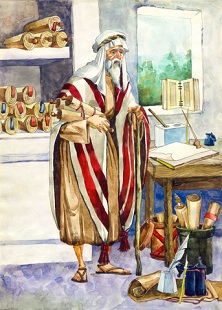Was Peter's Letter Forged?
Joseph Francis Alward
April 2, 2011
JFAlward@aol.com
The comments and observations in this web article relate to the book, “Forged,” by Bart Ehrman, who argues that the New Testament book, 1 Peter, traditionally believed to have been written by Peter, is forged. I apologize for not including the page numbers in the various citations from Ehrman's book; I have the iPad version of Prof. Ehrman's book.
Prof. Ehrman says that the Aramaic-speaking Peter was illiterate, and thus could not have written the Greek letter that appears under his name. Prof. Ehrman says,
"There are excellent reasons for thinking that Peter could not write.....Apart from....legendary accounts...all we know about Peter's life comes from the New Testament. What we principally learn is that before he was a follower of Jesus he was a fisherman from Capernaum in Galilee....According to Acts 4:13, both Peter and his companion John, also a fisherman, were agrammatoi, a Greek work that literally means 'unlettered,' that is, 'illiterate.' ....And so, is it possible that Peter wrote 1 and 2 Peter?....I should point out that the book of 1 Peter is written by a highly literate, highly educated, Greek-speaking Christian who is intimately familiar with the Jewish Scriptures in their Greek translation, the Septuagint. This is not Peter."
|
|

Painting of Saint Peter by Peter Paul Rubens
|
I agree that Peter might have been illiterate, but I disagree that he could not have been the author of 1 Peter. Even if Peter was illiterate, he could still have been the author of the letter, even though he himself did not put the pen to papyrus to physically create the letter. I believe, as do a host of others, that Peter basically could have told a Greek-speaking "secretary" what to write. Ehrman dismisses this possibility, stating his objections this way:
"Nor could he have dictated the letter in Aramaic and asked the secretary to translate it into Greek, because the letter contains sophisticated forms of argumentation and presentation that work only in Greek and presupposes knowledge of the Greek Old Testament, not the Hebrew version, which Peter himself would have been familiar with."
Peter's illiteracy does not force us to presuppose that Peter did not have a knowledge of the Greek Old Testament. Ehrman's claim supposes that an illiterate, Aramaic-speaking Peter could not have gained knowledge of the Greek Old Testament without being able to read Greek. But, of course, Peter could have gained such knowledge easily. Peter could have asked an Aramaic-speaking, highly literate "secretary" who was knowledgeable in the Greek Old Testament, and who also was familiar with "sophisticated forms of Greek argumentation and presentation," to read to him portions of the Greek Old Testament that the secretary knew would be theologically relevant to Peter, translating as he read, from the Greek to Aramaic, so Peter could understand.
After absorbing enough of the needed content from the Greek Old Testament, Peter would then have been able to convey to the secretary, in Aramaic, the gist of what he wished to say to his Greek-reading audience, idea by idea, sentence by sentence, speaking to the secretary as he wrote. The actual Greek words used, the grammar, sentence structure, would have been choices made by the secretary, and the secretary would make sure the arguments would work in Greek, but all of the ideas would have been Peter's, and he would have signed off on the final product, sentence by sentence. Is this what Prof. Ehrman thinks should be called a "forgery"? |
|

Peter's secretary could have had knowledge of the Greek Old Testament.
|
Even if it were true that the secretary composed the letter, Ehrman states that
" then the secretary rather than Peter would be the real author of the letter...."
Why would he not be the "real" author? The person who is the originator of all of the letter's instructions, visions, theological ideas and arguments in each sentence is the real author of such a letter, not the person who selected the right Greek words to use to best render the sentences into Greek, not the person who translated Peter's Aramaic words into their suitable Greek form.
Prof. Ehrman must not have had the scenario I describe here in mind, but instead may be imagining a straw-man case where Peter asks a secretary to write something theological, he doesn't care what, just make sure it sounds good. In such a case, of course, Ehrman would be right: the secretary would then be the "real author." That is not what we are talking about here, however.
As a final swipe at the notion that Peter used a secretary in the manner described above, Prof. Ehrman says this:
"... we don't seem to have any analogy for a procedure like this from the ancient world..."
Ehrman is employing the Absence of Analogy Fallacy, which goes like this: If nothing else like it happened, that we know of, we should consider it highly improbably that it happened at all. His implied meaning is that unless someone can find other examples of this procedure, we have no good reason to believe it was practiced by Peter.
It would be one thing if one were arguing that the practice was widespread, and that most writers of that time did such a thing quite regularly. In such a case, of course Prof. Ehrman would have a right to expect that there would be ample evidence of this having happened, because if so many people were doing it, someone must have mentioned it on the record. But, we are not claiming that lots of people did it. We are only suggesting that Peter could have done it, and furthermore anyone in his position likely would have done the same thing if he were intent on conveying his theological messages to a Greek-reading audience and required help in gaining knowledge of the Greek version of the Old Testament. Maybe Peter was the only person of note who ever had secretarial help of this nature provided to him, but just because he might have been the only one to do it, just because Ehrman is not aware of an analogous situation, does that mean that Peter couldn't have done it?
Is this proposed scenario really so unlikely, so unthinkable to Ehrman that we must find an example of someone else doing it before he would agree it Peter could have done it? Husbands in those days let their wives cut their hair, but we don't have anything written from that time that describes this as a normal practice, or even one example of a writer describing having experienced this himself, or heard about it being done, nobody saying their wife cut their hair, i.e., no analogy for a procedure like that from the ancient world. Does that absence of analogy make that procedure unlikely?
In summary, I believe Prof. Ehrman failed in his book to make the case that 1 Peter should be labeled a forgery. Ehrman claims that because Peter probably was illiterate, he couldn't have had the necessary background in the Greek Old Testament to write 1 Peter, and if he used a secretary to attempt to do so, the letter would still be a forgery, he asserts. I have disputed both of these claims. I have pointed out that it seems quiet believable that Peter could have learned about the Greek Old Testament from an Aramaic-speaking person who took Peter's ideas, sentence by sentence, and composed a letter in Greek for Peter, with Peter standing by as each sentence was constructed. Even though the words placed on the papyrus might not have been from Peter's hand, and the grammar and word choices and syntax might not have been his own, Peter nevertheless would have been the "real author."

Notes:
Comments about Prof. Ehrman's arguments that some of Paul's letters in the Old Testament were forged are at "Pastoral Forgeries."
Evidence that the Old and New Testaments teach that woman is inferior to man, and must never be allowed to lead or teach men, is found on websites at the following addresses:
The Glory of Man
Usurping Women

Joseph Francis Alward
|


